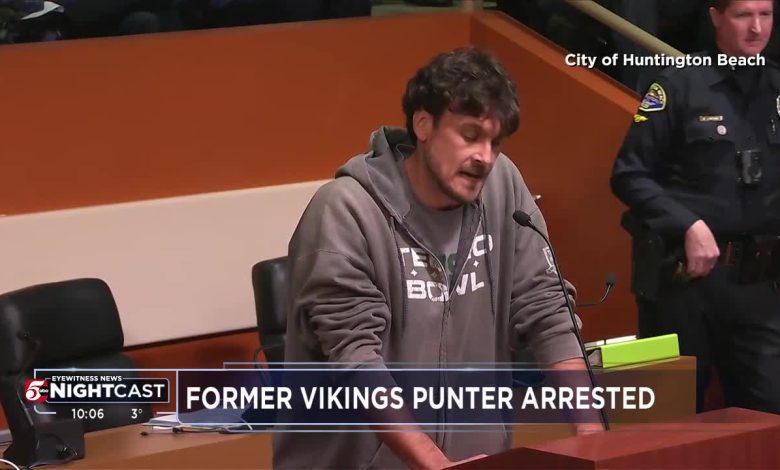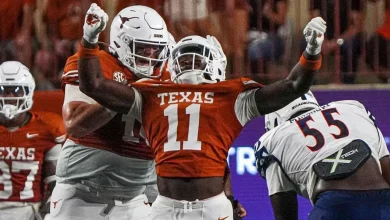Former Vikings punter Chris Kluwe arrested over protest at city council meeting

In an incident that reverberated through both the sports and political communities, Chris Kluwe, the former punter for the Minnesota Vikings, was arrested after protesting a proposed plaque at a Huntington Beach City Council meeting in February 2025. The arrest was the culmination of Kluwe’s passionate objection to the wording of the plaque, which he and many others believed carried a political message associated with the “Make America Great Again” (MAGA) movement. The event has sparked a nationwide conversation about free speech, civil disobedience, and the presence of political symbols in public spaces.
The Controversy: MAGA and Public Spaces
The plaque in question was part of a celebration of the Huntington Beach Central Library’s 50th anniversary. As the city council proposed the inscription, it became evident that the wording of the plaque contained a hidden message that many people—especially Kluwe—found troubling. The four words, “Magical,” “Alluring,” “Galvanizing,” and “Adventurous,” were carefully chosen to represent the library’s legacy. However, these words, when placed in sequence, spelled out “MAGA,” a slogan famously associated with former President Donald Trump and his supporters.
The inclusion of this seemingly innocuous word arrangement quickly ignited a heated debate in the community. While some viewed it as an unintentional coincidence, others—Kluwe among them—interpreted it as a subtle endorsement of the MAGA movement. Kluwe, a long-time activist and outspoken critic of political conservatism, particularly the Trump-era policies, felt that this was not a trivial matter. To him, the plaque was more than just a historical marker; it represented an endorsement of divisive political rhetoric that he believed undermined social progress and equality.
Chris Kluwe’s Advocacy and Political Stance
Chris Kluwe, who played for the Minnesota Vikings from 2005 to 2012, is no stranger to controversy. Throughout his NFL career, Kluwe became known not only for his exceptional punting skills but also for his outspoken advocacy on social issues, particularly LGBTQ+ rights and marriage equality. He was one of the few NFL players to publicly oppose the ban on same-sex marriage, and he used his platform to speak out against policies he viewed as harmful to marginalized communities.
Kluwe’s activism did not end when he retired from football. In fact, his post-NFL career has been marked by continued engagement in political and social causes, and he has often spoken candidly about the need for greater inclusivity and progressive policies. His arrest at the Huntington Beach City Council meeting was a direct result of his longstanding commitment to speaking out against what he perceives as the harmful rise of conservative, right-wing politics, especially in the wake of the Trump administration.
For Kluwe, the “MAGA” movement represents a set of values he sees as deeply destructive, from the erosion of LGBTQ+ rights to a divisive national rhetoric that often ignores the struggles of people of color, immigrants, and other marginalized groups. His decision to protest the plaque was rooted in his belief that political symbols should not be subtly embedded in public spaces, especially in an environment meant to be neutral and inclusive, like a public library.
The Protest at the City Council Meeting
Kluwe’s protest began during the public comment portion of the city council meeting. After listening to the council members discuss the plaque, he took the floor to voice his concerns. His speech was impassioned, direct, and unmistakably political. Kluwe made it clear that he believed the “MAGA” arrangement was not an accident, but a deliberate message that would be seen by many as an endorsement of a movement he found deeply troubling.
Standing before the council, Kluwe decried what he saw as a growing trend of embedding political ideologies into public spaces. He argued that the plaque, while seemingly benign, was a symbol of a larger cultural moment where political power was subtly exerted over public institutions. He criticized the city council for failing to recognize the implications of their decision and accused them of aligning with a political ideology that, in his view, contradicted the values of fairness, equality, and inclusivity.
“I cannot stand by and watch as our city, our library—our public spaces—become platforms for a political agenda that actively harms marginalized communities,” Kluwe told the council. “This plaque, whether you intended it or not, is a message. It’s a message that tells people who don’t fit into your vision of America that they are unwelcome.”
Kluwe’s speech quickly garnered attention, but it also led to his arrest. As he continued to speak, the council members tried to regain control of the meeting. Tensions escalated as Kluwe refused to end his remarks, stating that he would not leave until the council addressed the issue. This resulted in the police being called to remove him from the meeting. The former NFL star was arrested for disrupting an assembly, a charge that reflected his refusal to comply with the meeting’s rules.
The Arrest and Aftermath
Kluwe’s arrest was met with mixed reactions. Some of the public and local media outlets expressed support for his stance, praising him for using his platform to protest what they saw as an insidious form of political messaging in public spaces. Others, however, criticized Kluwe for turning a routine city council meeting into a political spectacle and argued that his protest was an overreaction to what they considered a harmless commemoration.
In the wake of the arrest, Kluwe issued a statement expressing his disappointment with the council’s actions. “This isn’t about me,” he wrote. “This is about the message we send when we allow political movements to creep into every corner of our lives. Public spaces should be places where all people feel welcome, not platforms for the agendas of the few.”
The incident has sparked renewed debate over the role of political symbols in public spaces and the use of public institutions to promote political messages. Supporters of Kluwe argue that his protest was a necessary act of civil disobedience, drawing attention to a deeper issue of political polarization and the erosion of shared civic spaces. Critics, on the other hand, contend that Kluwe’s actions were disruptive and inappropriate, turning a simple anniversary plaque into a battleground for political ideology.
The National Conversation on Free Speech and Political Symbols
Kluwe’s arrest brings to the forefront an important conversation about free speech, the politicization of public spaces, and the boundaries of protest. At the heart of the issue is the question of how far individuals can go in protesting what they perceive to be political overreach, especially when it comes to public institutions like libraries, schools, and government buildings.
While the First Amendment protects individuals’ right to free speech, there are still legal limits to how and when that speech can be expressed in public forums. Kluwe’s decision to speak out at a city council meeting falls squarely within the boundaries of free speech, but the disruption of the meeting raised questions about the appropriateness of his actions. Was his protest a legitimate form of civil disobedience, or was it an attempt to hijack a public forum for personal political gain?
Furthermore, the debate over political symbols in public spaces highlights the increasing role that symbols and messaging play in shaping public opinion and identity. The “MAGA” movement is deeply polarizing, and its presence in public spaces—whether in the form of a plaque, a flag, or a slogan—has the potential to evoke strong emotional responses from people on both sides of the political spectrum.









